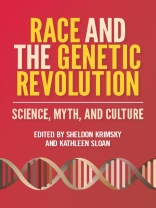Do advances in genomic biology create a scientific rationale for long-discredited racial categories? Leading scholars in law, medicine, biology, sociology, history, anthropology, and psychology examine the impact of modern genetics on the concept of race. Contributors trace the interplay between genetics and race in forensic DNA databanks, the biology of intelligence, DNA ancestry markers, and racialized medicine. Each essay explores commonly held and unexamined assumptions and misperceptions about race in science and popular culture.
This collection begins with the historical origins and current uses of the concept of ’race’ in science. It follows with an analysis of the role of race in DNA databanks and racial disparities in the criminal justice system. Essays then consider the rise of recreational genetics in the form of for-profit testing of genetic ancestry and the introduction of racialized medicine, specifically through an FDA-approved heart drug called Bi Dil, marketed to African American men. Concluding sections discuss the contradictions between our scientific and cultural understandings of race and the continuing significance of race in educational and criminal justice policy.
Innehållsförteckning
Acknowledgments
Introduction: How Science Embraced the Racialization of Human Populations
Sheldon Krimsky
Part I. Science and Race: Historical and Evolutionary Perspectives
1. A Short History of the Race Concept, by Michael Yudell
2. Natural Selection, the Human Genome, and the Idea of Race, by Robert Pollack
Part II. Forensic DNA Databases, Race, and the Criminal Justice System
3. Racial Disparities in Databanking of DNA Profiles, by Michael T. Risher
4. Prejudice, Stigma, and DNA Databases, by Helen Wallace
Part III. Ancestry Testing
5. Ancestry Testing and DNA: Uses, Limits, and Caveat Emptor, by Troy Duster
6. Can DNA ’Witness’ Race? Forensic Uses of an Imperfect Ancestry Testing Technology, by Duana Fullwiley
Part IV. Racialized Medicine
7. Bi Dil and Racialized Medicine, by Jonathan Kahn
8. Evolutionary Versus Racial Medicine: Why it Matters?, by Joseph L. Graves, Jr.
Part V. Intelligence and Race
9. Myth and Mystification: The Science of Race and IQ, by Pilar N. Ossorio
10. Intelligence, Race, and Genetics, by Robert J. Sternberg, Elena L. Grigorenko, Kenneth K. Kidd, and Steven E. Stemler
Part VI. Contemporary Culture, Race, and Genetics
11. The Elusive Variability of Race, by Patricia J. Williams
12. Race, Genetics, and the Regulatory Need for Race Impact Assessments, by Osagie K. Obasogie
Conclusion: Toward a Remedy for the Social Consequences of Racial Myths, by Kathleen Sloan
List of Contributors
Index
Om författaren
Sheldon Krimsky is professor of urban and environmental policy and planning and adjunct professor of public health and community medicine at Tufts University. He is the author of nine books, including Science in the Private Interest: Has the Lure of Profit Corrupted Biomedical Research? and is coauthor with Tania Simoncelli of the recent Columbia University Press title Genetic Justice: DNA Databanks, Criminal Justice, and Civil Liberties.Kathleen Sloan has run nonprofit organizations for more than twenty years and has directed communications and public relations functions for multinational corporations and nonprofits. She organized a major national conference on the impact of forensic DNA databanks on racial disparities in the criminal justice system for the Council for Responsible Genetics, where she formerly directed programs on both race and genetics and women and biotechnology.












